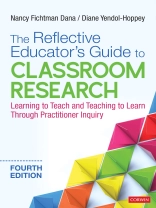Harness the power of data to transform classrooms through inquiry and analysis with this updated, best-selling resource
When teachers examine the simple but complex act of teaching, the power yielded can be transformative. For three editions, teacher preparation and professional development providers have turned to this bestselling how-to guide for an authentic clear description of teacher inquiry and how to harness it for greatest effect.
In this 4th edition, readers will journey toward understanding the link between teacher inquiry and the creation of data-driven classrooms by walking through some of today’s most relevant scenarios as well as timeless and enduring examples. Featuring helpful exercises and step-by-step instructions, this edition includes:
• A head on discussion of equity and social justice and the role inquiry plays in tackling it
• A look at professional practice doctoral programs as ripe context for inquiry
• A complete chapter on the role literature plays in teacher research
• A more seamless integration between the text and accompanying website
Grab this text, raise your voice at the table of educational reform, and transform assumptions for more impactful teaching.
Daftar Isi
Preface
About This Book
Acknowledgments
About the Authors
How to Use the Inquiry Books
Chapter 1. Teacher Inquiry Defined
What Is Teacher Inquiry?
What Is the Relationship Between Teacher Inquiry and Teacher Professional Growth?
What Evidence Exists That Teacher Inquiry Is Worth Doing?
How Is Teacher Inquiry Different From What I Already Do as a Reflective Teacher?
Why Inquire? Inquiry as a Pathway to Equity
What Are Some Contexts Ripe for Teacher Inquiry?
How Does My Engaging in Teacher Inquiry Help Shape the Profession of Teaching?
Chapter 2. The Start of Your Journey: Finding a Wondering
Where Do I Begin?
Where Do I Find My Wonderings and Questions?
What Happens If I Still Cannot Locate My Wondering?
Chapter 3. Learning With and From the Literature: The Importance of Reading
Why Read?
Where and How Do I Find Readings to Inform My Inquiry?
A Few Words of Literature Wisdom
Chapter 4. Learning With and From Your Colleagues: The Importance of Collaboration
Why Is Collaboration So Important?
What Are the Possibilities for How I Might Collaborate?
Chapter 5. Developing a Research Plan: Making Inquiry a Part of Your Teaching Practice
What Do Data Look Like, How Do I Collect Them, and How Do They Fit Into My Work as a Teacher?
When Do I Collect Data and How Much Do I Collect?
Chapter 6. Considering the Ethical Dimensions of Your Work as an Inquirer
What Should I Consider When Thinking About Ethics in Relation to Practitioner Research?
What Role Do School District Research Policies Play in the Inquiry Process?
What Role Do University Institutional Review Boards Play in the Inquiry Process?
Chapter 7. Finding Your Findings: Data Analysis
What Is Formative Data Analysis?
What Is Summative Data Analysis?
What Might Summative Analysis of Qualitative Data Look Like?
Chapter 8. Making Your Inquiry Public: Publishing and Presenting
Why Is It Important to Share My Work With Others?
How Do I Present My Work?
How Do I Write About My Work?
What Might My Writing Look Like?
Chapter 9. Contributing to the Creation of More Equitable Schools and Classrooms: The Why of Inquiry
Coming to View Inquiry as a Pathway to Equity: A Teacher Researcher’s Story (Mickey Mac Donald)
Informing Thinking, Teaching, and Teacher Education: The Power of Equity-Focused Inquiry (Paige Bildstein, Mikhayla Kruse-Meek, Jillian Pohland, Nicole Snitkey, and Hilarie Welsh)
Chapter 10. On Your Way: Becoming the Best Teacher and Researcher You Can Be
What Is an Inquiry Stance?
Why Is It Important to Assess the Quality of My Work?
What Is the Difference Between Generalizability and Transferability?
How Do I Go About Assessing Teacher Research Quality and Why Is It So Difficult to Do?
What Are Some Quality Indicators for Teacher Research?
What Are Some Ways to Enhance Inquiry Quality?
Where Do I Go From Here?
References
Index
Tentang Penulis
Diane Yendol-Hoppey is professor of teacher education in the College of Education and Human Services at the University of North Florida. She has served as dean, associate dean of educator preparation and partnerships, department chair, and center director. She taught for many years at the University of Florida where she was the evaluator of numerous district, state, and national professional development efforts. Before beginning her work in higher education, Yendol-Hoppey spent 13 years as an elementary school teacher in Pennsylvania and Maryland. She holds a Ph D in curriculum and instruction from The Pennsylvania State University. Yendol-Hoppey’s current work explores national and international research focusing on teacher education clinical practice, job-embedded professional learning, and teacher leadership. Yendol-Hoppey has received the AERA Division K Early Career Research Award and the ATE Distinguished Teacher Educator Award for her ongoing commitment to researching innovative approaches to teacher learning. She has published six books, more than 60 articles in professional journals, and secured 20 million in external funding to support teacher learning.












